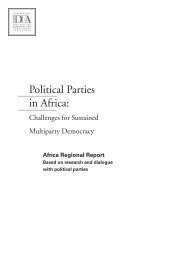FOLKETINGET – THE DANISH PARLIAMENT
FOLKETINGET – THE DANISH PARLIAMENT
FOLKETINGET – THE DANISH PARLIAMENT
Create successful ePaper yourself
Turn your PDF publications into a flip-book with our unique Google optimized e-Paper software.
the maKing oF laWs<br />
INFORMALLY<br />
The media <strong>–</strong> or the organizations<br />
via the media <strong>–</strong> can try<br />
to exert an influence throughout<br />
the process. They can<br />
warn the politicians that if<br />
they adopt one thing or<br />
another, it will have serious<br />
consequences.<br />
Organizations which have<br />
different interests try to obtain<br />
the greatest influence<br />
possible in the lawpreparing<br />
committee.<br />
The influence becomes greater<br />
the sooner it takes place<br />
before the Bill is introduced.<br />
If the organizations wish to<br />
try to influence legislation<br />
further, they contact the<br />
Government, the parties or<br />
specially selected Members<br />
of the Parliament. Representatives<br />
of the organizations<br />
can like ordinary citizens ask<br />
for an interview with the<br />
Members of the committee<br />
dealing with the Bill.<br />
FORMALLY<br />
A minister, a Member of the Parliament, an organization, the media or a<br />
citizen becomes aware of a problem. The matter is taken up politically.<br />
A Minister can set up a<br />
commission or a working group<br />
consisting of experts and the<br />
parties involved.<br />
The Government introduces<br />
Bills.<br />
One or more Members of the<br />
Parliament introduce Bills.<br />
At the first reading in the Chamber, a Bill is discussed in principle.<br />
After the first reading, the Bill is normally examined by one of the 25<br />
standing committees of the Parliament.<br />
The committee makes a report often comprising amendments.<br />
Second reading of the Bill in the Chamber. Eventual amendments are<br />
put to the vote. The report is part of the reading.<br />
The Bill may again be examined by the committee; or the Parliament<br />
may choose to let the Bill pass on directly to the third reading.<br />
Third and last reading in the Chamber. After a short reading eventual<br />
amendments are put to the vote and finally the entire Bill is put to the<br />
vote.<br />
A Bill which has been passed<br />
does not take effect until it<br />
has received the Royal Assent.<br />
If the Bill does not obtain a<br />
majority, it becomes vold.<br />
27

















